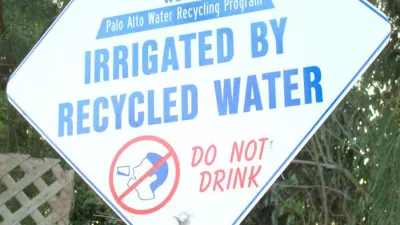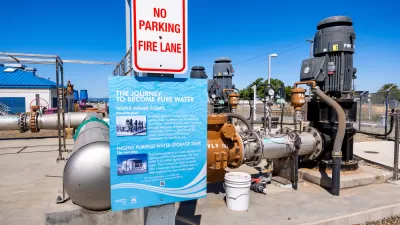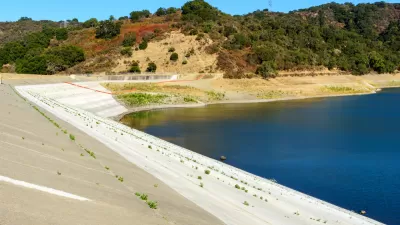San Francisco's water district has become the first in the nation to require newly constructed large buildings to collect and reuse nonpotable water.

First, the city approved in 2012 a program that permits developers to construct systems for collecting onsite nonpotable water and reuse it for nonpotable purposes, such as toilets and irrigation. "This voluntary program has been a tremendous success, with over 30 projects in the city either in design, construction or operation to date," according to Laura Tam, sustainable development policy director at SPUR, an early supporter of the program.
Then, in 2013 the city expanded the program to provide permits and grants for networks of buildings to share and redistribute nonpotable water. "We think that sharing and recycling water resources across property lines may have the best economies of scale for water treatment and the highest potential to offset potable water use," writes Tam.
This past summer, the San Francisco Public Utilities Commission (SFPUC) took this innovation a step further, becoming the first water utility to require all new construction over 250,000 square feet to use available graywater and rainwater sources for its nonpotable needs. Further, the grant program has been expanded to include existing buildings and networks of buildings and redefined eligibility in terms of a building's water use rather than building size.
SPUR is optimistic about the potential impact of these programs and has awarded the SFPUC its Good Government Award. Tam cautions that while Californians may see more rain this year, drought conditions can be expected to persist well into the future, and innovation is essential to sustainability. Other large water districts will benefit from the example set in the Bay Area.
"While we all need to keep saving water — and will need to even once it starts raining again — San Francisco can be proud of how local innovation and public support for water resilience is catalyzing private investment in sustainable infrastructure. Expanding building and district-scale water re-use could transform urban water demand — and especially its growth trajectory — for the Bay Area and beyond."
FULL STORY: SF’s Latest Tool to Save More Water: Pay Building Owners to Recycle It

Alabama: Trump Terminates Settlements for Black Communities Harmed By Raw Sewage
Trump deemed the landmark civil rights agreement “illegal DEI and environmental justice policy.”

Planetizen Federal Action Tracker
A weekly monitor of how Trump’s orders and actions are impacting planners and planning in America.

The 120 Year Old Tiny Home Villages That Sheltered San Francisco’s Earthquake Refugees
More than a century ago, San Francisco mobilized to house thousands of residents displaced by the 1906 earthquake. Could their strategy offer a model for the present?

In Both Crashes and Crime, Public Transportation is Far Safer than Driving
Contrary to popular assumptions, public transportation has far lower crash and crime rates than automobile travel. For safer communities, improve and encourage transit travel.

Report: Zoning Reforms Should Complement Nashville’s Ambitious Transit Plan
Without reform, restrictive zoning codes will limit the impact of the city’s planned transit expansion and could exclude some of the residents who depend on transit the most.

Judge Orders Release of Frozen IRA, IIJA Funding
The decision is a victory for environmental groups who charged that freezing funds for critical infrastructure and disaster response programs caused “real and irreparable harm” to communities.
Urban Design for Planners 1: Software Tools
This six-course series explores essential urban design concepts using open source software and equips planners with the tools they need to participate fully in the urban design process.
Planning for Universal Design
Learn the tools for implementing Universal Design in planning regulations.
Clanton & Associates, Inc.
Jessamine County Fiscal Court
Institute for Housing and Urban Development Studies (IHS)
City of Grandview
Harvard GSD Executive Education
Toledo-Lucas County Plan Commissions
Salt Lake City
NYU Wagner Graduate School of Public Service




























